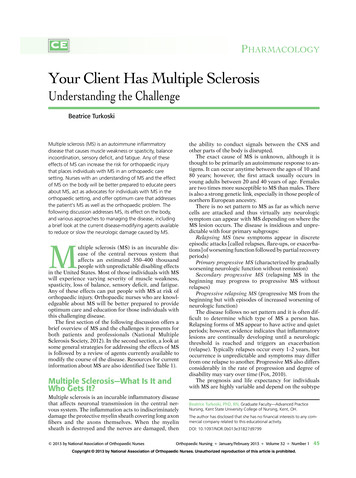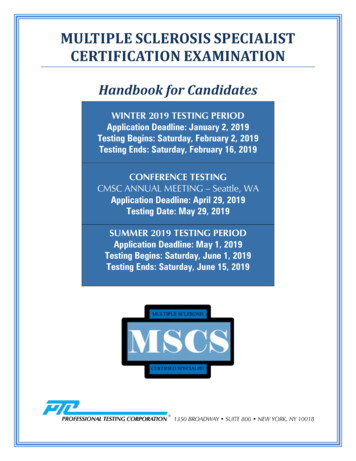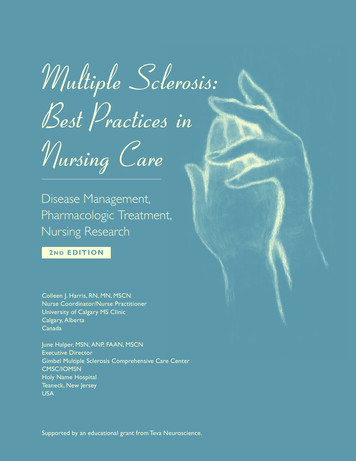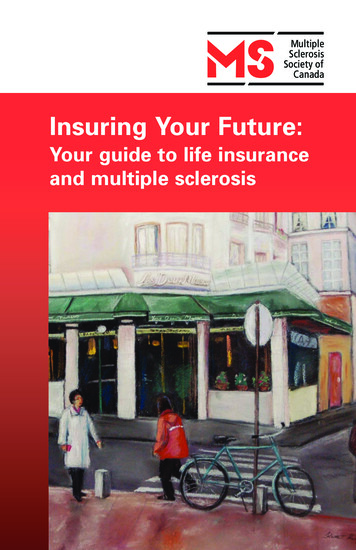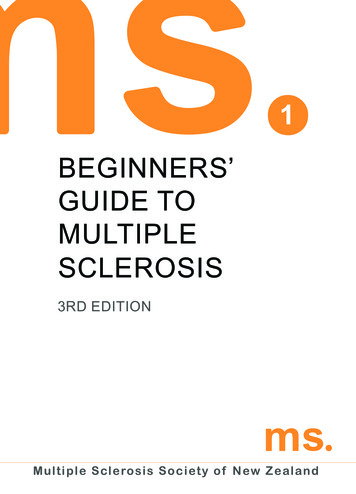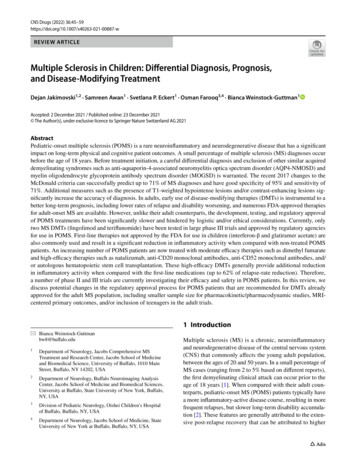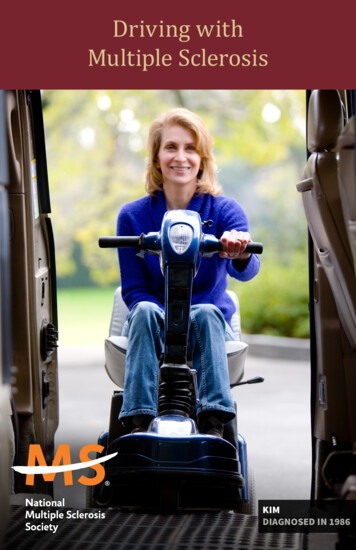
Transcription
Driving withMultiple SclerosisKIMDIAGNOSED IN 1986
Driving withMultiple SclerosisBy Patricia M. Niewoehner, OTR/L, CDR andFlorian P. Thomas, MD, PhD, NeurologistMs. Niewoehner is an occupational therapist and certifieddriver rehabilitation specialist. She works in the PhysicalMedicine and Rehabilitation Department at the VA MedicalCenter in St. Louis, MO.Dr. Thomas is board certified in neurology, spinal cordmedicine, and neural repair and rehabilitation, and completeda neuroimmunology fellowship. He is the chair of theNeuroscience Institute and the director of the MS Center atHackensack University Medical Center. He has served in variousfunctions including as a member of the board, the clinicaladvisory committee and the government relations committeeof the Gateway Area Chapter of the National MS Society, whichawarded him its 2006 Pathlighter Award.Review performed by Patricia M. Niewoehner March, 2020. 2020 National MS Society. All rights reserved.
ContentsIntroduction.1Ways in which MS symptoms may affectyour driving ability and safety.1Driving evaluations.3Adaptive automobile equipment.6Selecting and funding specializedautomobile adaptive equipment .7State Department of Motor Vehicles(DMV) policy .8Disabled parking placards . 10What if it’s no longer safe to drive? . 11Resources. 12
IntroductionDriving — one of the many ways we maintain ourindependence — is also one of the most complexactivities in our daily lives. Although symptomsassociated with MS can affect the skills necessary forsafe driving, adaptive automobile equipment may bean option to help you drive safely. Here we review theskills necessary for safe driving, information aboutdriving evaluations, types of adaptive auto equipment,and Department of Motor Vehicle policies. Lastly,to help maintain your independence if driving is nolonger possible, other transportation options arereviewed.Ways in which MS symptomsmay affect your drivingability and safetyA person’s driving performance may be negativelyaffected by symptoms associated with MS. Forexample, cognitive changes (memory loss, decreasedinformation processing speed and impaired visualspatial skills) and spasticity (muscle stiffness orspasms) affect driving performance, putting theperson at an increased risk for an automobile crash. Inaddition, your ability to drive safely may be affected ifyou experience any of the following:Driving with Multiple Sclerosis National MS Society 1
Difficulty getting into or out of a vehicleDifficulty moving your foot from gas to brake pedalsMuscle weakness or stiffness/spasms/cramps orpain, particularly in the arms or right footLoss of sensation in the feet or handsImpaired coordinationSlowed reaction timeFatigueSeizures or loss of consciousnessBlurred vision, blind spots, double vision or loss ofcolor visionCognitive problems such as short-term memoryloss; disorientation while driving such as forgettingyour destination, getting confused about where youare or missing exits; poor concentration; inability tomulti-task; and confusion about how to turn the caron or offMood changes: depression and/or problemscontrolling angerMedication side effects, such as drowsiness,difficulty concentrating and/or poor coordinationand reaction timeEven if your MS symptoms seem to be mild andmanageable, other indications that your driving safetymay already be compromised include automobile crashesor near misses, moving violations, and the unwillingnessof others to be a passenger while you are driving.Driving with Multiple Sclerosis National MS Society 2
Most people with MS experience exacerbations (alsocalled attacks or relapses). During exacerbationsdriving may be difficult or unsafe, but may returnto normal as the exacerbation ends and symptomsimprove. However, people with progressive forms ofMS may experience a slow worsening of abilities thatcan permanently affect driving.When your body is under increased stress, such ashaving the flu, your MS symptoms may be worse. Inaddition, symptoms can fluctuate significantly duringthe course of a day. Planning daily activities aroundthese fluctuations in energy is critical to optimizingyour personal safety and that of others while you aredriving. It is important to talk with your healthcareprovider about the best strategies for managing yourfatigue effectively.Driving evaluationsIf you or others are concerned about your abilityto drive, you may consider obtaining a drivingevaluation. Driving evaluations help identify anychallenges you may be experiencing, and theappropriate adaptive equipment to keep you safely onthe road.Driver rehabilitation clinics are located in medicalcenters and community based clinics. A drivingevaluation is performed by a driver rehabilitationspecialist (DRS). A DRS is typically an occupationalDriving with Multiple Sclerosis National MS Society 3
therapist with specialized training in driverrehabilitation. Since the driving evaluation is usuallyperformed by a therapist using specialized equipment,it is more comprehensive than a typical Department ofMotor Vehicle (DMV) road test.While the length of the evaluation varies, you shouldexpect it to last about two hours; it includes anoffice-based assessment and a behind-the-wheelevaluation. The office-based assessment includesa review of your medical and driving history, and alook at how MS affects your ability to perform otheractivities of daily living such as bathing, dressingor medication management. You will be askedabout specific problems you may have with driving,any citations you have received while driving, andaccidents or near misses. In addition the followingwill be assessed: Functions such as strength, range of movement,coordination, sensation and motor speedVision including visual acuity, depth perception,color vision and road sign recognitionCognitive performance to determine how quicklyyour brain processes information and how MS maybe affecting memory, visual searching and visualspatial relationsIf you demonstrate adequate vision, cognition andmotor function during the office-based assessment, abehind-the-wheel road test will be performed, usuallyin the facility vehicle. The road test will generallyDriving with Multiple Sclerosis National MS Society 4
begin in low traffic areas and proceed to morecomplex or higher traffic areas. Your ability to safelyoperate the car will be evaluated, including: Ability to transfer safely in and out of the vehicleAbility to stow any assistive devices like awheelchair, walker or caneAbility to follow the rules of the roadReaction time in identifying potential hazardson the roadReaction time maneuvering the vehicle andmoving your foot back and forth between thegas and brake pedalsVisual searching, scanning and attention abilitiesUse of good judgment before executing a maneuver(e.g., a left turn)Ability to multi-taskAbility to stay within a lane and to changelanes safelySafety awareness while drivingDriving evaluations and training typically are notcovered by health insurance. Contact your insuranceprovider for details.Driving with Multiple Sclerosis National MS Society 5
Adaptive automobileequipmentSpecialized adaptive equipment may be recommendedto help you adjust for deficits that interfere with yourdriving: Hand controls to operate the gas and brakeSpinner knob to turn the steering wheelAdaptive steering and/or braking that requiresless effortHigh-tech driving equipment for gas, brake andsteering control for those with significant physicalimpairments. Extensive training is required andcosts may be highWide angle rear view mirror, larger outside driverand passenger side mirrors and/or a multi-panelrear view mirrorSpecialized seats to ease vehicle transfersLifts for stowing wheelchairs and assistive devicesLowered-floor vans equipped with a ramp or lift toaccommodate a wheelchairTie-downs to secure mobility devicesOnce the driver rehabilitation specialist hasrecommended specific auto equipment, you willneed training on how to use the equipment properlyand safely. The training is usually performed in thefacility vehicle. Length of training varies depending onDriving with Multiple Sclerosis National MS Society 6
the type of equipment and the individual’s learningstyle. Training generally concludes when you havedemonstrated safe operation of the equipment on alltypes of roadways. A mobility equipment dealer canthen install the adaptive equipment.The next step is a road test at your local DMV todemonstrate your ability to use the equipmentsafely. In many cases, the DRS who trained you willtake you to the DMV so that you can be tested in thesame vehicle in which you were trained, or you cantake the test in your own adapted vehicle. The DMVthen indicates on your driver’s license that you arerequired to drive with specialized auto equipment.As with any medical condition that may affect yourability to drive, a re-evaluation of your driving skillsand/or use of adaptive driving equipment may benecessary if your symptoms progress over time.Selecting and fundingspecialized automobileadaptive equipmentThe National Mobility Equipment Dealers Association(NMEDA) sets the industry standards and providesa list of certified dealers that sell adapted vehiclesand perform mobility equipment installations. Itis important to have any adaptive auto equipmentinstalled by a certified dealer in order to ensure safety.Driving with Multiple Sclerosis National MS Society 7
The cost of vehicle modifications varies greatlydepending on the type of equipment. Whether youare purchasing a new vehicle or would like to addadaptive auto equipment to your existing vehicle,there are public and private opportunities for funding.Your driver rehabilitation specialist can direct youto potential community resources that providefunding. Rebates for adaptive auto equipment maybe available for a new vehicle purchase — contactthe vehicle manufacturer for more information. Themodifications you need may also be eligible for a taxcredit - check with an accountant to see if you qualify.For more information on funding options, visitnationalMSsociety.org/stayingmobile.State Department of MotorVehicles (DMV) policyStates vary widely in their regulations concerningdrivers with medical conditions. Most states rely onthe individual driver to disclose medical conditionsthat may affect driving ability and safety, and failureof a driver to disclose medical conditions that mightaffect driving may result in legal penalties and denialof insurance claims. Although a diagnosis of MS itselfdoes not automatically preclude you from driving,the loss of function associated with MS may affectdriving skills. Each state has its own procedures forre-evaluation of driving skills or reinstating drivingDriving with Multiple Sclerosis National MS Society 8
privileges; this usually requires your healthcareprovider to complete a medical report form clearingyou medically to drive. However, if your physician isunable or unwilling to complete this medical report,a formal driving evaluation by a DRS may be analternative. In addition, you may still be required topass a state road test once your healthcare providerhas signed a medical clearance form. You shouldcontact your state DMV for specific information.Keep in mind that if a medical review is required, itcould take time. Be sure to apply for your renewalprior to the expiration date on your license — if you letyour driver’s license expire, it is unlikely that you willbe provided with a temporary license to use duringyour medical review process. Discuss your renewal inadvance with your healthcare provider so you will havequick access to your medical records if necessary.If your license is denied or revoked, utilize the processfor driving privilege appeal if necessary. Be an activistand involve your local legislators in the process sothat they are aware of the challenges that individualswith MS and other chronic diseases face whennavigating state agencies.Driving with Multiple Sclerosis National MS Society 9
Disabled parking placardsDisabled parking is sometimes a necessity for peopleliving with MS and the medical requirements varyby state. As a general rule, the use of any assistivedevice such as a wheelchair, crutches or cane wouldqualify a person for disabled parking. Many states alsoinclude certain cardiovascular conditions, respiratoryproblems and conditions that cause pain whilewalking or otherwise require the person to rest afterwalking a very short distance. Age and weakness mayalso be covered.Being able to park closer to your destination cansave you energy and allow you to run errands orparticipate in other activities. If you feel your mobilityis significantly impaired and you would benefit froma placard, talk to your healthcare provider. States varyin how they administer disabled parking placards.Contact your state DMV for details.The availability of reserved parking spaces isregulated by both federal and state laws. Under theAmericans with Disabilities Act (ADA) any place ofbusiness or other location that provides parking to thepublic must designate a number of disabled-accessiblespaces that is proportionate to the total number ofspaces available at the facility. If you have questionsabout accessible parking in the areas you frequent,or if you feel spaces are being inappropriately used,contact your local motor vehicle office for guidance.Driving with Multiple Sclerosis National MS Society 10
What if it’s no longer safeto drive?It is important to recognize when you are no longersafe to perform certain activities. Just as you mightplan for other circumstances associated with MS,planning for the day when driving may no longerbe possible can help ease the transition. If you findyourself grieving the loss of driving, you might wantto talk with a therapist. Talking with your healthcareprovider may be helpful if you are having difficultyunderstanding why others have concerns about yourdriving safety.Alternative transportationParatransit is a van and taxi program for peopleunable to independently use public transit becauseof a disability or disabling health condition. Since1990, the Americans with Disabilities Act (ADA)has required that all public transit agencies provideparatransit services to qualified people withdisabilities. Paratransit services are intended forpeople living with disabilities regardless of age.When looking for alternatives to driving you may alsoconsider exploring the following: Rent a ramp van from a mobility dealerAsk a friend or family member for a ride;consider offering to pay for the gasTake a taxi or use a ride-share appDriving with Multiple Sclerosis National MS Society 11
Ask about volunteer drivers at your localcommunity center, place of worship or local serviceorganizationCheck with your state agency responsible formaking sure people with disabilities havetransportationResourcesNational MS 4-4867The Society has resources for finding new, used orrented accessible vehicles, and funding resources foraccessible vehicle purchase or modifications. Call toconnect to an MS Navigator or search for resourcesonline at nationalMSsociety.org/FDR.Driving with Multiple Sclerosis National MS Society 12
The National Multiple Sclerosis Society is proud to bea source of information about multiple sclerosis. Ourcomments are based on professional advice, publishedexperience and expert opinion, but do not representindividual therapeutic recommendations or prescriptions.For specific information and advice, consult your physician.Early and ongoing treatment with an FDA- approvedtherapy can make a difference for people with multiplesclerosis. Learn about your options by talking to yourhealthcare professional and contacting the Society atnationalMSsociety.org or 1-800-344-4867.The Society publishes many other resources about variousaspects of MS. Visit nationalMSsociety.org/brochuresor call 1-800-344-4867.Driving with Multiple Sclerosis National MS Society 13
The Society mobilizes people and resources so that everyoneaffected by multiple sclerosis can live their best lives as westop MS in its tracks, restore what has been lost and endMS forever. Last year, the Society invested 35 million inMS research with more than 340 active projects around theworld. Through its comprehensive nationwide network ofservices, the Society is focused on helping those affected byMS connect to the people, information and resources neededto live their best lives. We are united in our collective powerto do something about MS now and end this disease forever.Learn more at 44-4867 2020 National MS Society. All rights reserved.ER6022 6/20Driving with Multiple Sclerosis National MS Society 14
Driving with Multiple Sclerosis By Patricia M. Niewoehner, OTR/L, CDR and Florian P. Thomas, MD, PhD, Neurologist Ms. Niewoehner is an occupational therapist and certified driver rehabilitation specialist. She works in the Physical Medicine and Rehabilitation Department at the VA Medical Center in St. Louis, MO.
